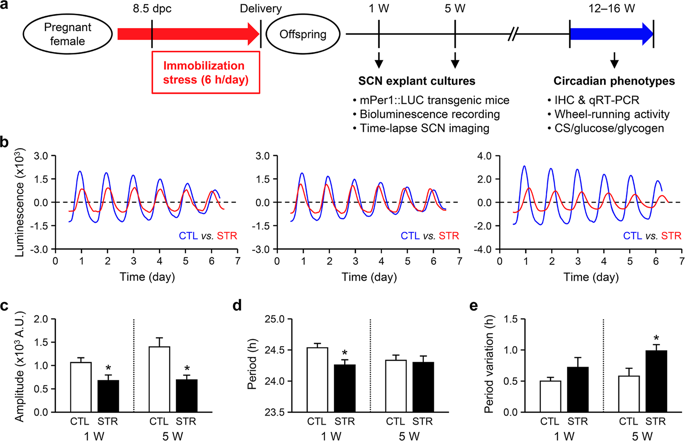当前位置:
X-MOL 学术
›
Exp. Mol. Med.
›
论文详情
Our official English website, www.x-mol.net, welcomes your
feedback! (Note: you will need to create a separate account there.)
Programming effects of maternal stress on the circadian system of adult offspring.
Experimental & Molecular Medicine ( IF 9.5 ) Pub Date : 2020-03-11 , DOI: 10.1038/s12276-020-0398-9 Seongsik Yun 1, 2 , Eun Jeong Lee 1 , Han Kyoung Choe 1 , Gi Hoon Son 2 , Kyungjin Kim 1 , Sooyoung Chung 3
Experimental & Molecular Medicine ( IF 9.5 ) Pub Date : 2020-03-11 , DOI: 10.1038/s12276-020-0398-9 Seongsik Yun 1, 2 , Eun Jeong Lee 1 , Han Kyoung Choe 1 , Gi Hoon Son 2 , Kyungjin Kim 1 , Sooyoung Chung 3
Affiliation

|
Maternal stress has long-lasting influences on the brain functions of offspring, and several brain regions have been proposed to mediate such programming. Although perinatal programming of crosstalk between the circadian and stress systems has been proposed, the functional consequences of prenatal stress on the circadian system and the underlying mechanisms remain largely unknown. Therefore, we investigated whether exposing pregnant mice to chronic restraint stress had prolonged effects on the suprachiasmatic nucleus (SCN), which bears the central pacemaker for mammalian circadian rhythms, of offspring. SCN explants from maternally stressed mice exhibited altered cyclic expression patterns of a luciferase reporter under control of the mouse Per1 promoter (mPer1::LUC), which manifested as a decreased amplitude and impaired stability of the rhythm. Bioluminescence imaging at the single-cell level subsequently revealed that impaired synchrony among individual cells was responsible for the impaired rhythmicity. These intrinsic defects appeared to persist during adulthood. Adult male offspring from stressed mothers showed advanced-phase behavioral rhythms with impaired stability as well as altered clock gene expression in the SCN. In addition to affecting the central rhythm, maternal stress also had prolonged influences on the circadian characteristics of the adrenal gland and liver, as determined by circulating corticosterone levels and hepatic glycogen content, and on canonical clock gene mRNA expression in those tissues. Taken together, our findings suggest that the SCN is a key target of the programming effects of maternal stress. The widespread effects of circadian disruptions caused by a misprogrammed clock may have further impacts on metabolic and mental health in later life.
中文翻译:

产妇应激对成年后代昼夜节律系统的编程作用。
产妇压力对后代的脑功能有长期影响,已经提出了几个大脑区域来介导这种程序。尽管已经提出了在昼夜节律系统和应激系统之间进行串扰的围产期编程,但是产前应激对昼夜节律系统的功能后果及其潜在机制仍然未知。因此,我们研究了将怀孕的小鼠置于慢性束缚压力下是否对后on上核(SCN)有延长的影响,后者对后代的哺乳动物昼夜节律起着重要的起搏器作用。在小鼠Per1启动子(mPer1 :: LUC)的控制下,来自受母体胁迫的小鼠的SCN外植体表现出萤光素酶报道分子的循环表达模式改变,表现为振幅降低和节律稳定性降低。随后在单细胞水平上进行生物发光成像,发现单个细胞之间的同步性受损是造成节律性降低的原因。这些固有的缺陷在成年期似乎仍然存在。来自紧张母亲的成年雄性后代表现出晚期行为节奏,稳定性受损,SCN中的时钟基因表达改变。除了影响中心节律外,母亲的压力还对肾上腺和肝脏的昼夜节律特征产生了长期影响,这取决于循环皮质酮水平和肝糖原含量,以及这些组织中经典时钟基因mRNA的表达。综上所述,我们的发现表明SCN是孕产妇压力影响编程的主要目标。
更新日期:2020-04-24
中文翻译:

产妇应激对成年后代昼夜节律系统的编程作用。
产妇压力对后代的脑功能有长期影响,已经提出了几个大脑区域来介导这种程序。尽管已经提出了在昼夜节律系统和应激系统之间进行串扰的围产期编程,但是产前应激对昼夜节律系统的功能后果及其潜在机制仍然未知。因此,我们研究了将怀孕的小鼠置于慢性束缚压力下是否对后on上核(SCN)有延长的影响,后者对后代的哺乳动物昼夜节律起着重要的起搏器作用。在小鼠Per1启动子(mPer1 :: LUC)的控制下,来自受母体胁迫的小鼠的SCN外植体表现出萤光素酶报道分子的循环表达模式改变,表现为振幅降低和节律稳定性降低。随后在单细胞水平上进行生物发光成像,发现单个细胞之间的同步性受损是造成节律性降低的原因。这些固有的缺陷在成年期似乎仍然存在。来自紧张母亲的成年雄性后代表现出晚期行为节奏,稳定性受损,SCN中的时钟基因表达改变。除了影响中心节律外,母亲的压力还对肾上腺和肝脏的昼夜节律特征产生了长期影响,这取决于循环皮质酮水平和肝糖原含量,以及这些组织中经典时钟基因mRNA的表达。综上所述,我们的发现表明SCN是孕产妇压力影响编程的主要目标。










































 京公网安备 11010802027423号
京公网安备 11010802027423号